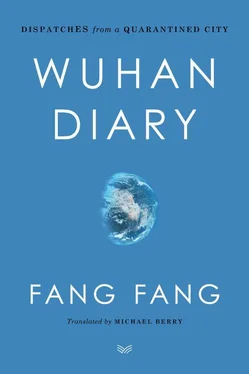These lines are taken from Wang Changling’s poem “Seeing Off Imperial Censor Chai” (“Song Chai shiyu”), which dates from the Tang Dynasty.
One Person, One City ( Yigeren he yizuo chengshi ) was a 2002 CCTV documentary series directed by Wei Dajun and written by Li Hui and Feng Jicai. The series contained 17 episodes to approach various cities in China through the personal lens of famous writers; including Liu Xinwu (Beijing), Sun Ganlu (Shanghai), and Zhang Xianliang (Yinchuan). The episode on Wuhan featured Fang Fang.
Tang Xiaohe (b. 1941) was born in Wuchang and is regarded as one of China’s leading oil painters active during the Mao period. Many of his revolutionary-themed paintings were widely reprinted and circulated as posters and murals; many of his works have been included in the collection of the China Art Gallery.
Lei Feng (1940–1962) was a “model soldier” serving in the People’s Liberation Army who was espoused by Mao Zedong and elevated to the role of national hero for his willingness to sacrifice for others, display modesty, and work hard without any hope for credit or reward. Decades after his tragic death, schoolchildren throughout China are still taught to “learn from the spirit of Lei Feng.”
Zhang Manling (b. 1948) is a film director, producer, and writer. She was the first Chinese woman to be featured on the cover of TIME magazine during the Reform Era. She is the award-winning author of numerous books and screenplays.
Sacrificed Youth ( Qingchun ji ) was a 1985 film adapted from Zhang Manling’s novella A Beautiful Place ( Yige meili de difang ). The film was directed by Zhang Nuanxin (1940–1995) and explored themes of sexual awakening and minority cultures through the lens of an “educated youth” sent to Yunnan during the Cultural Revolution.
According to traditional Chinese custom, the “Seventh Day” ( tou qi ) is a rite that occurs seven days after a death. It is believed that on the Seventh Day the soul of the deceased will return home. On that day, the deceased person’s family is expected to prepare a meal for the dead and then retreat to the bedroom or somewhere out of sight, so that the wandering soul won’t run into their family members and get nostalgic, which could threaten the deceased person’s ability to be reborn.
Liu Shouxiang (1958–2020) was a Chinese watercolor painter who also served as professor at the Hubei Institute of Film Arts. He was the founding director the Art Education Department at his Institute and he held individual exhibitions in Germany, Hong Kong, and Taipei, along with his work being exhibited in major collections all over the world. Professor Liu died of COVID-19 on February 13, 2020, at the Jinyintan Hospital in Wuhan.
Xiang Ligang (b. 1963) is a political commentator specializing in the field of communications. He is active on Chinese social media, with over 1 million followers on Weibo.
Liu Fan (1961–2020) was the first nurse to die due to COVID-19 in China. She worked at Wuchang Hospital in Wuhan where she served as deputy chief nurse. Her death was widely covered by the media in China and gained a massive amount of attention due to the fact that her parents and brother also died due to novel coronavirus. Early on, her death was subject to a variety of online rumors and speculations.
Duan Zhengcheng (1934–2020) was a professor at Huazhong University of Science and Technology. He was a leading specialist in his field and an academician of the Chinese Academy of Engineering. He also worked as an industrial engineer and inventor, specializing in automation. His contributions were varied and spanned many industries ranging from automotive to laser surgery. He died on February 15, 2020, from the novel coronavirus.
Haizi (1964–1989) was an iconic poet who started writing poetry in 1982. He took his life by laying down on a set of railroad tracks on March 26, 1989, at the age of 25. He was one of the most influential poets of the 1980s and his work has continued to be reprinted since his death. In this passage, Fang Fang playfully cites a line from his famous poem, “Tonight in Delingha” (“Jinye zai Delingha”), the final line of which reads, “Sister, tonight I care not about mankind, I care only about you.”
Chang Kai (1965–2020) was a filmmaker working with the Hubei Film Studio, where his work involved preserving and dissemination of traditional Chinese opera films. His sister Liu Fan and his parents also died from the novel coronavirus.
Pan Xiangli (b. 1966) holds a PhD in literature and is a writer and editor based in Shanghai. Pan is also the vice chair of the Shanghai Writers Association. She is the author of numerous books, including That Age When You Still Believe in Love ( Xiangxin ai de nianji ) and The Lotus That Penetrates the Heart ( Chuan xin lian ).
A Soft Burial ( Ruan mai ) is a novel by Fang Fang published in 2017. It explores the decades-long trauma and pain of the Land Reform Movement on a family, using amnesia as a metaphor for the loss of historical memory. The novel was subject to vicious attacks by ultra-leftist groups in China and was subsequently banned.
In China the term “ultra-leftists” refers to political groups with strong nationalist views and ties to the leftist movement of the Cultural Revolution (1966–1976). They represent the more conservative faction of the Chinese Communist Party and are often critical of capitalism and the West.
Liu Zhiming (1968–2020) was a 1991 graduate of the Medical College of Wuhan University. He was a neurosurgeon and director of the Department of Neurosurgery at Third Municipal Hospital of Wuhan before being appointed president of Wuchang Hospital in 2015. Dr. Liu died on February 18, 2020, due to lung failure after being afflicted with the novel coronavirus.
Xiang Xinran (b. 1940) is regarded as one of China’s leading architects. His best-known projects include the reconstruction of the Yellow Crane Tower and the new addition to the Hubei Provincial Museum. He has also served as a member of the People’s Congress.
Liu Daoyu (b. 1933) is a well-known educator, chemist, and social activist. He has served as the chancellor of Wuhan University and various high-level roles within the Chinese Ministry of Education. Besides his research accomplishments in the field of chemistry, he has also authored numerous books on education and career planning.
While still preliminary, more recent studies have suggested that one reason so many healthcare practitioners have not only been infected but also suffered severe symptoms from COVID-19 may have to do with them being exposed to a higher “viral load.” In “Viral Dynamics in Mild and Severe Cases of COVID-19,” published on March, 19, 2020, a study of coronavirus patients in Nanchang, China, indicated a preliminary correlation between the severity of symptoms and the amount of virus present in the nose.
If Wuhan has a true media, would there have been an outbreak?” (“’Ruguo Wuhan de meiti shi zhenzheng de meiti, Wuhan haihui baofa yiqing ma?”) published on the website “Daily Focus” (“Jiaodian ribao”) on February 26, 2020. http://www.jdxwrb.com/pingshuo/1596.html?from=singlemessage&isappinstalled=0#10006-weixin-1-52626-6b3bffd01fdde4900130bc5a2751b6d1.
Читать дальше



![О Генри - Закупщик из Кактус-Сити [The Buyer from Cactus City]](/books/405348/o-genri-zakupchik-iz-kaktus-thumb.webp)








